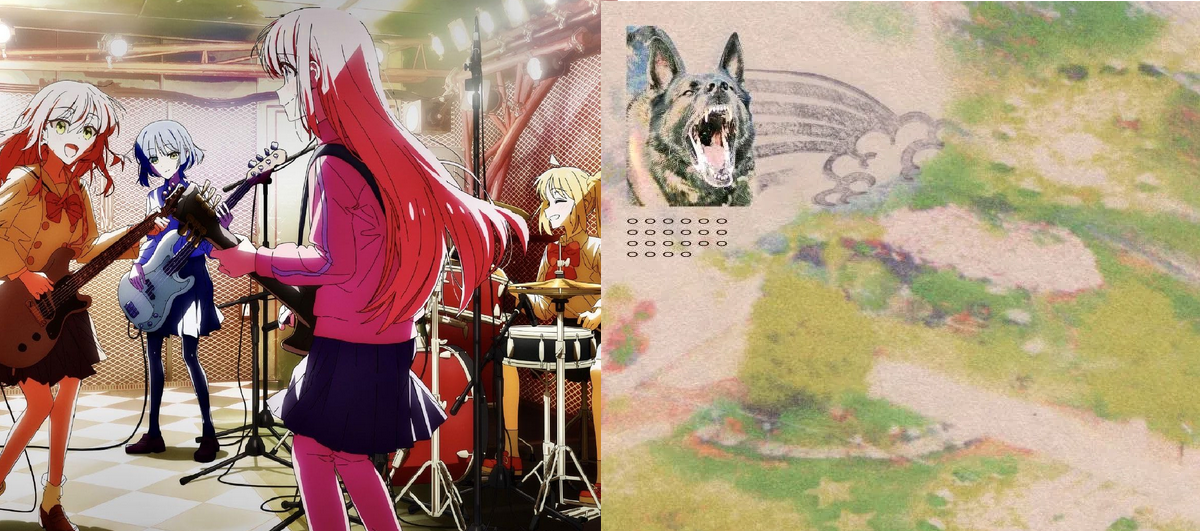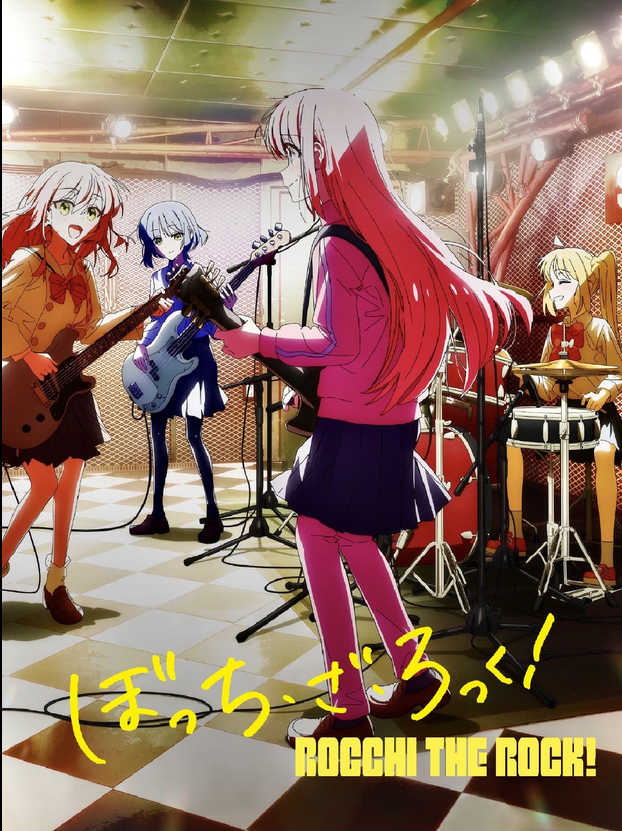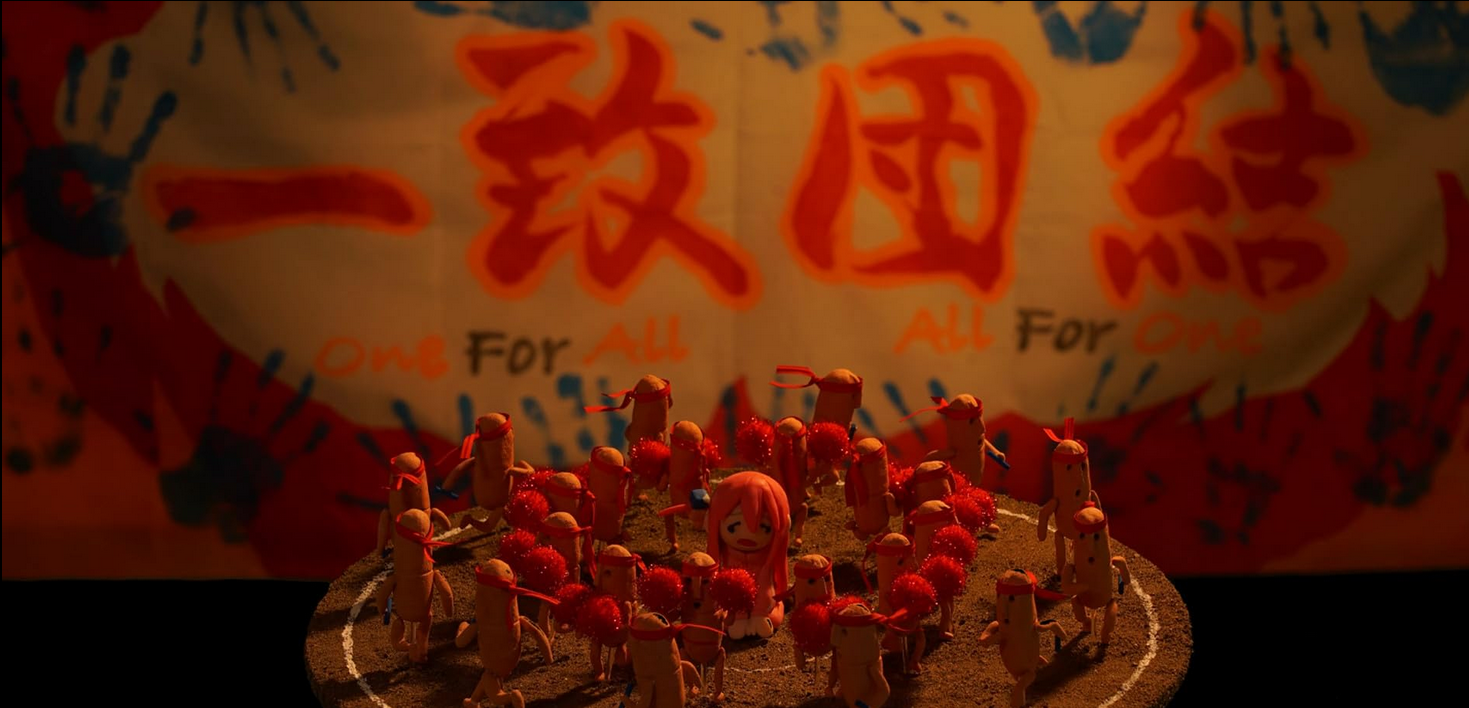
Is reviewing 6 pieces of media every three months sustainable? No. No, it’s not. But hopefully I make up for the lack of quantity of recommendations this time around with quality and thematic cohesion.
That’s right! This month’s edition of Stuff I Liked is a rock n’ roll double feature examining cute-girls-doing-cute-things music anime Bocchi the Rock! and indie band Feeble Little Horse’s most recent album, Girl With Fish.
Bocchi the Rock! (CloverWorks, 2022)

I finished watching Bocchi the Rock! a couple of months ago and have barely been able to stop thinking about it since (at least, as of the time that I wrote the first draft of this review in July? I've chilled out about Bocchi a little bit since them).
Originally, Lisa had wanted to watch the classic girl band anime K-On! (2009) based on its cuteness. I had attempted to watch K-On! years ago, but abandoned it halfway through out of boredom. Given its critical acclaim and popularity, I figured we could give it a second chance.
We barely made it through the first two episodes before dumping it. I applaud K-On! for its animation and well-executed slapstick, but otherwise, it felt like a show that featured music and neurodivergent characters but didn’t have much to say about either. The writing lacked self-awareness, grating character flaws were not presented as such, and while it is typical for a slice-of-life anime to be lacking in character or plot development, there isn’t much else of substance besides cartoon girls being cute and making cute noises to the point of infantilization. And, yes, I know that both K-On and Bocchi both fall under the cute-girls-doing-cute-things genre, so yes, I know that's the point, and yes, I’m sure that someone reading this who has watched all of K-On! can offer a strong counterargument that I’m wrong and that the show is deeper than I give it credit for, but it doesn’t change the fact that the show has twice failed to keep my attention long enough to prove me wrong. And so, at a friend’s recommendation, we decided to give Bocchi the Rock! a try instead.
Bocchi is the show I wished K-On! was. It’s a coming-of-age story about Hitori “Bocchi” Gotoh, a virtuoso teenage guitarist with crippling social anxiety. After unilaterally failing to make friends with anyone for years, she finds herself recruited into a band of high school girls (Kessoku Band), but despite her incredible talent as a solo musician, her stage fright and inability to communicate with her fellow musicians on-stage prevents her from playing competently with others.
Like K-On!, Bocchi is a comedy about cute anime girls playing rock music, but it feels much more substantial, largely thanks to its writing. While character traits such as Hitori’s social anxiety or bassist Ryo’s hipster pretentiousness are often exaggerated for comedic effect, these exaggerations feel deliberate and grounded in real experience (the main exception to this being Hiroi’s alcoholism, which is distractingly prominent but isn’t explored thoughtfully, but I digress). Bocchi straight-up nails how it feels to be a lonely and anxious young person who fundamentally misunderstands their weaknesses. To do this, CloverWorks makes excellent use of a wide toolbox of styles and techniques, using anything from live footage to stop-motion animation and real-time game graphics for its gags. Beyond just making the show fun to watch in itself, Bocchi’s stylistic diversity does a great job of communicating to the viewer when Hitori’s (often extreme) internal monologue and anxious behaviors should be interpreted literally and when they should instead be understood impressionistically.

The main cast is well fleshed out, and while Hitori’s growth is sometimes frustratingly gradual over the show’s 12-episode run, the show is an adaption of only the first volume and a half of a serialized manga that’s been ongoing for six years – for better or for worse, it isn’t a complete story in itself. On that note, unfortunately, I can’t talk about Bocchi without taking an awkward mid-review detour to talk about its final episode and, by extension, some of its issues with pacing. Despite Hitori’s developing ability to overcome her anxiety and converse with strangers over the course of the series, the finale ends with a scene in which Hitori just straight-up fails to navigate a social interaction with a music shop clerk. In the original manga, the scene works as a mid-volume piece of filler that reminds us that personal growth isn’t strictly linear. As the conclusion of the anime, however, it effectively reverts Hitori’s character to where it started, undermining her growth over the course of the show and leaving myself and some of my friends (we had a watch party) frustrated or annoyed with the character. I understand that there are challenges to adapting the beginning of an unfinished story into a 12 episode anime, but remaining blindly faithful to the source material for the final episode felt like a strange choice. The end result is a show that tells a very satisfying story with its first 8 episodes, followed by an anti-climatic 4 episode epilogue.
Even though the finale left a bitter taste in my mouth, it still hasn't stopped me from thinking about Bocchi nearly every day since. Part of this is because the source material is thoughtful and the adaption is so well executed. Part of this is because I’ve binged the entire manga to-date and can re-contextualize the anime and its ending within a larger story. But the final reason is that I’m a bass-playing woman with a history of social anxiety, so, yeah, of course this show was going to speak to me. Sure, Hitori’s social incompetence is overacted and cringey, but I spent my lunches in my sophomore year of high school either sitting in silence at the corner of the table if I wasn’t just straight-up sitting by myself because I was too scared to play any active role in making friends, and in hindsight, that too was a comparatively high level of social dysfunction for a 15 year old. It’s something of a cliché among the Bocchi fandom to talk about how you find the protagonist relatable, but, well… here we are.
The show also speaks to me as a musician. Bocchi’s music and narrative feels genuinely rooted in local rock-and-roll counterculture. Plot and character elements are built upon sincere understandings of how rock musicians write songs, rehearse, improvise, and cohesively play as a unit. If manga author Aki Hamaji hasn’t played with an indie rock band in urban hole-in-the-wall venues herself, she is doing a very good job of fooling me.
Kessoku Band’s songs themselves are more intricate, polished, accessible, and poppy than an actual amateur teenage rock band’s would be – like with musical numbers, they must have mainstream appeal while supporting the narrative – but the music clearly draws upon indie, alt, and psychedelic rock influences in an earnest way. Again, the show expertly captures the feeling of a phenomenon – playing rock music in a small, local club - even if it plays loosely with the reality of it. Bocchi’s music peaks with the performance in episode 8. In the scene, Kessoku Band bombed the first song of their set, motivating Hitori to reinvigorate the band with an unscripted guitar solo. In a lesser anime, the guitar solo recorded for the scene would be an unremarkable and cheesy imitation of self-indulgent 1970’s guitar heroics – something that signals to the viewer that “this person is good at guitar!” but is otherwise totally bland. The solo that we actually got? It gives me goosebumps.
And don’t get me started on the rumbling bass and guitar hook in the intro, or the frantic outro guitar solo, or the way that the vocalist, Kita, still looks uncertain as she pushes through the vocals. Mm! What a good bit of animation!
I don’t think that Bocchi the Rock! resonated with me so strongly simply because it was a show about social anxiety and music, but because the writers, animators, and musicians responsible for the manga and the anime have thorough understandings of the subject matter and were able to communicate them with remarkable creativity, humor, and skill. A few glaring flaws aside, there’s a lot to love here. I hope to see the remainder of the manga brought to life in subsequent seasons.
In conclusion, if Aki Hamaji isn’t slowly building a romance between Hitori and Kita and has instead been queerbaiting me for the previous 69 chapters of the manga, I will kill myself on live television.
Girl with Fish (Feeble Little Horse, 2023)

My lamentations in my previous post about how I’ve barely discovered new music in the past decade have inspired me to get up and go out looking for some, and golly gee, I’m real tickled with what I found.
Girl with Fish is the second album from Feeble Little Horse, a 4-piece indie noise/pop/rock band from Pittsburg. Stylistically, they cover a fair bit of ground, so its hard to describe them succinctly, but for the most part, their melodies are catchy, their lyrics are sharp, and their guitars are very, very fuzzy. Except for when they aren’t. The band’s guitarists both have impressive pedalboards and they take full advantage of them, switching between satisfyingly crunchy sounds and dreamy tones within the same song. There are times when I think that they sound like the Breeders, but sometimes a guitar part will remind me of what I've heard of Mac DeMarco, and then sometimes they’ll go all out and evoke Sonic Youth, except Feeble Little Horse is just their own darn thing anyway.
The album itself is short, but dense, running through 11 songs in just 26 minutes. But, as short as each song is, most explore an impressive number of ideas. A single verse or chorus is rarely repeated more than twice, and certainly not the same way. Most songs feel more linear in their structure than cyclical. Because of its brevity, Girl with Fish is an album that frustratingly leaves me wanting more, but that isn’t necessarily a bad thing. I don’t remember the last time that I’ve so eagerly relistened an album to two or three times back-to-back, and at the end of the day, I’d much rather listen to songs that tease me than songs that overstay their welcome.
And the collection of songs themselves are wonderful! After listening to many indie albums that are frontloaded with a couple of strong singles followed by 10 dull filler songs, it’s refreshing to come across an album that is strong from start to finish. “Freak,” “Tin Man,” and “Steamroller” provide a strong, fuzzy, in-your-face introduction to the album. Shortly thereafter, “Paces” provides a poppy interlude before continuing into “Sweet,” the track that perhaps best combines their noisier tendencies with their defter ones, a perfect transition track to the album’s quieter second half. The acoustic guitar opening of “Slide” breaks the tension that’s built over the album’s first half, with tracks like “Healing” and “Station” providing much of the second half’s dreamy counterbalance. In the midst of them, there’s “Pocket,” another poppy interlude than unexpectedly breaks into punkish rage before returning to its cheery foundation. The album concludes with the comparatively chill but anthemic “Heavy Water.” If there were a weak track in the album, it’d be the fourth track, “Heaven,” whose first half feels simplistic and whose second half is just maybe too jarbled, but hell, I won’t even commit to that position. Some days I skip it, some days I feel that it is integral to the album as a whole. Writing 11 songs for a sohpomore album and having (at least) 10 of them be bangers is an accomplishment.
I love Girl with Fish, I'm sad that my CD of the album already got scratched, and I can't wait to hear what Feeble Little Horse does next.